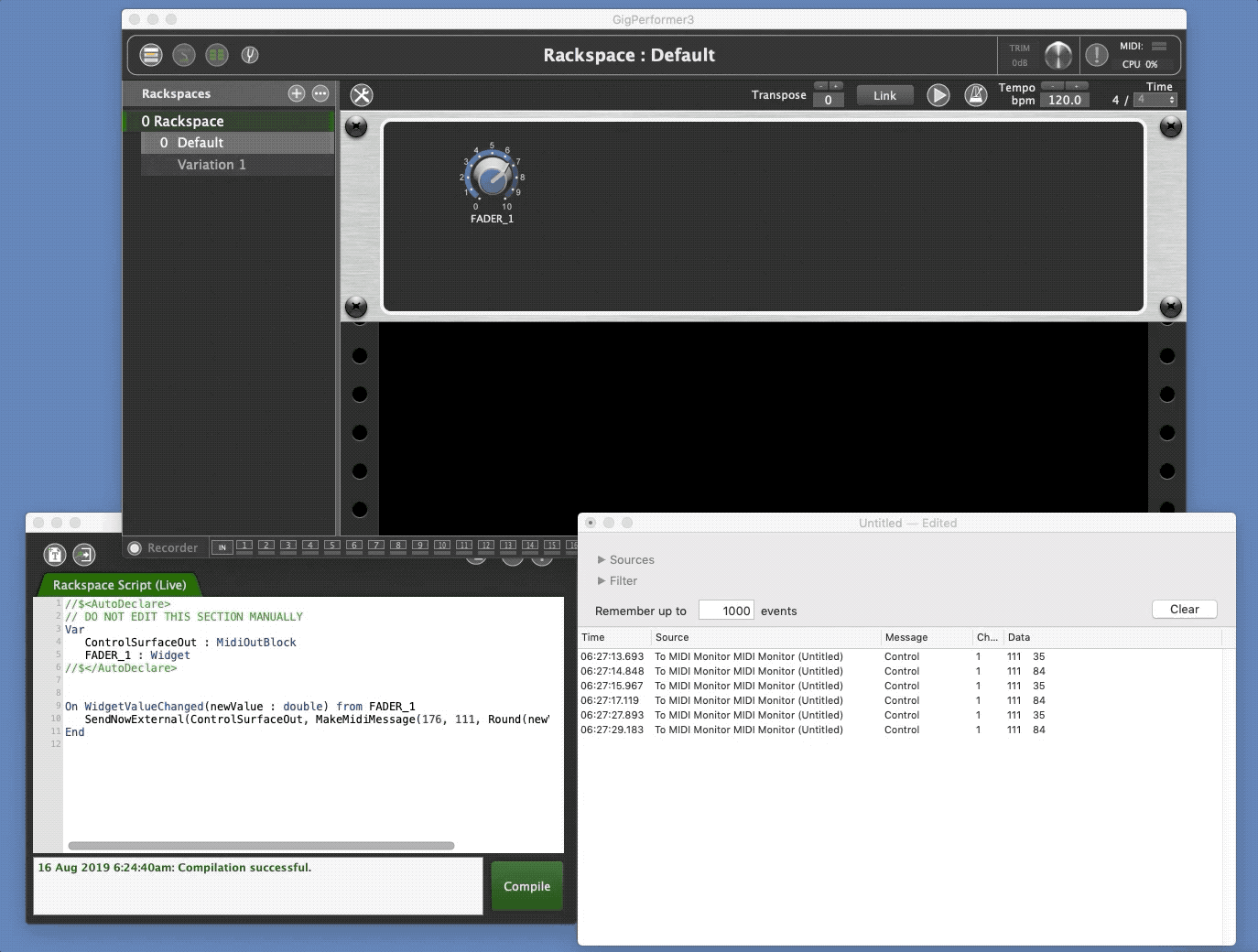Thanks! That’s quite the hack but it works great! I just wrote code to show the current rackspace name on my Arturia Keylab mk2’s LCD screen. A couple notes/wishlist items, and I’ll share the code at the bottom:
- Global Scripts would be nice. If the interacted with the rig system that would be even better (though you’d probably need to add oop and inheritance to GPScript for the last bit so I understand that’s a stretch :D)
- Some sort of way to share code between rackspaces, even if it’s just a basic #include style copypaste
- Understand that documentation is a pain, especially for something like this. Maybe make it a wiki or host it on github so that the community can help?
- Add me to the list of people asking for OnSongActivate - Looks like from another thread you’ve written the code so hopefully it’s easy!
- String constant expressions are pass by reference, which leads to the rather confusing behavior that
var s : String; s = "foo"; bar(s); is not equivalent to bar("foo"); if bar modifies its argument. If all non-primitive types exhibit this behavior it would be helpful if it was explained in the tutorial.
I’ll share my code in case anyone else is using the keylab:
var
Keylab2 : MidiOutBlock;
SysEx : SysexManager;
KEYLAB2_LCD_PRE : String;
KEYLAB2_LCD_SEP : String;
KEYLAB2_LCD_END : String;
ASCII_STRING : String;
ASCII_HEX_STRING : String array;
Initialization
ASCII_STRING = " !\"#$%&'()*+,-./0123456789:;<=>?@ABCDEFGHIJKLMNOPQRSTUVWXYZ[Y]^_`abcdefghijklmnopqrstuvwxyz{|}><";
ASCII_HEX_STRING = ["20","21","22","23","24","25","26","27","28","29","2A","2B","2C","2D","2E","2F","30","31","32","33","34","35","36","37","38","39","3A","3B","3C","3D","3E","3F","40","41","42","43","44","45","46","47","48","49","4A","4B","4C","4D","4E","4F","50","51","52","53","54","55","56","57","58","59","5A","5B","5C","5D","5E","5F","60","61","62","63","64","65","66","67","68","69","6A","6B","6C","6D","6E","6F","70","71","72","73","74","75","76","77","78","79","7A","7B","7C","7D","7E","7F"];
KEYLAB2_LCD_PRE = "# F0 00 20 6B 7F 42 04 00 60 01 ";
KEYLAB2_LCD_SEP = " 00 02 ";
KEYLAB2_LCD_END = " 00 F7";
End
Function StringToHexString(str : String) Returns String
var i : Integer
result = "";
For i=0; i<Length(str) ; i=i+1 Do
result = result + ASCII_HEX_STRING[IndexOfSubstring(ASCII_STRING, CopySubstring(str,i,1), True)];
End
End
Function Keylab2LCD(line0 : String, line1 : String)
If Length(line0) > 16
Then
line0 = CopySubstring(line0, 0, 16);
End
line0 = StringToHexString(line0);
If Length(line1) > 16
Then
line1 = CopySubstring(line1, 0, 16);
End
line1 = StringToHexString(line1);
SM_CreateSysexFromString(SysEx, KEYLAB2_LCD_PRE + line0 + KEYLAB2_LCD_SEP + line1 + KEYLAB2_LCD_END);
SM_SendMidiOut(SysEx, Keylab2);
End
On Activate
var s : String;
s = "Rackspace:";
Keylab2LCD(s, GetRackspaceName());
End



